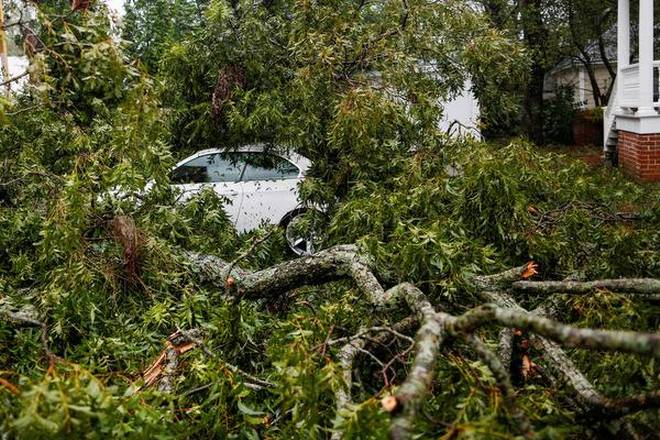Florence plows inland, leaving five dead, states flooded

WILMINGTON, N.C. (Reuters) - Florence plowed into the Carolinas and lumbered slowly inland , knocking down trees, gorging rivers, dumping sheets of rain and leaving five people dead before it was downgraded to a tropical storm still capable of wreaking havoc.
Though Florence’s shrieking winds diminished from hurricane force as it came ashore, forecasters said the sheer size of the 350-mile-wide storm and its painfully slow progress across North and South Carolina in the coming days could leave much of the region under water.
The dead included a mother and baby who were killed when a tree fell on their home in Wilmington, North Carolina. The child’s injured father was taken to a hospital. In the state’s Pender County, a woman died of a heart attack; paramedics trying to reach her were blocked by debris.
Two people died in Lenoir County. A 78-year-old man was electrocuted attempting to connect extension cords while another man perished when he was blown down by high winds while checking on his hunting dogs, a county spokesman said.
In New Bern, North Carolina, the storm surge overwhelmed the town of 30,000, located at the confluence of the Neuse and Trent rivers.
Jay Manning said he and his wife watched with alarm as water filled the street.
“We moved all the furniture up in case the water comes in but the water seems to be staying at the edge of the driveway,” he said, adding that if the wind picks up and the rain keeps coming, that could change. “My wife’s in a panic right now.”
Florence had been a Category 3 hurricane on the five-step Saffir-Simpson scale with 120-mph winds as of Thursday, but dropped to a Category 1 hurricane before coming ashore near Wrightsville Beach close to Wilmington.
The National Hurricane Center downgraded it to a tropical storm , but warned it would dump as much as 30 to 40 inches of rain on the southeastern coast of North Carolina and into the northeastern coast of South Carolina in spots.
“This rainfall will produce catastrophic flash flooding and prolonged significant river flooding,” the hurricane center said.
Atlantic Beach on North Carolina’s Outer Banks islands had already received 30 inches (76 cm) of rain, the US Geological Survey said.
By Friday night the center of the storm had moved to eastern South Carolina, about 15 miles northeast of Myrtle Beach, with maximum sustained winds of 70 mph.







